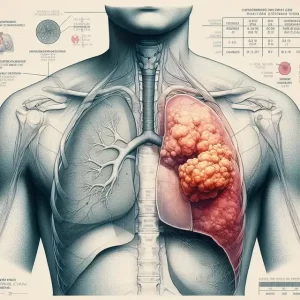Is CAR-T Cancer Immunotherapy Still Safe After Two Deaths Reported?
- Why Everyone Should Learn CPR and AED Use?
- New Targeted Therapy for Small Cell Lung Cancer (SCLC) Targeting DLL3
- Why is the Weight Loss Miracle Drug Effective?
- Is CAR-T Cancer Immunotherapy Still Safe After Two Deaths Reported?
- Major Breakthrough in Infertility Research: This Stem Cell Could Be Key to IVF and Other Fertility Treatments
- Flesh-Eating Bacteria Infection Over 1000 Cases in Japan!
Is CAR-T Cancer Immunotherapy Still Safe After Two Deaths Reported?
- Chinese-made Drug Enters Australia: Causing at Least 20 Deaths!
- How serious is Japan’s “flesh-eating bacteria” problem?
- Taiwan 6th wave of COVID outbreak: 623 confirmed cases in one week and 38 deaths
- FDA has mandated a top-level black box warning for all marketed CAR-T therapies
- Can people with high blood pressure eat peanuts?
- What is the difference between dopamine and dobutamine?
- How long can the patient live after heart stent surgery?
Is CAR-T Cancer Immunotherapy Still Safe After Two Deaths Reported?
The debate over the risk of death versus survival benefits of CAR-T therapy has been ongoing among clinical experts.
Previously, the FDA announced the addition of a black box warning regarding the risk of T-cell malignancies to six types of cell therapies (link to related report:). The FDA stated that in the clinical trial data for currently approved CAR-T therapies targeting BCMA and CD19, there have been reports of mature T-cell cancers (including CAR-positive tumors), some of which were fatal.
Stanford and the University of Pennsylvania conducted long-term follow-up studies on these findings. Both studies concluded that secondary cancers occurred in less than 10% of patients. In one case of fatal secondary T-cell cancer, it was suggested that the CAR-T therapy might have caused immunosuppression leading to the cancer. Researchers from these universities believe that the risk of secondary malignancies from CAR-T therapy is low.
The FDA’s black box warning has heightened public anxiety, while outside researchers argue that serious incidents are rare and seek to alleviate concerns about CAR-T therapy. This has further complicated the balance between the risks and benefits of CAR-T therapy.
Yesterday, Lyell Immunopharma announced clinical results for its ROR1 CAR-T therapy, causing its stock to drop by 35% due to a death related to the therapy.
1. Two Deaths: High Risk Behind Efficacy
Lyell released Phase 1 clinical results for its ROR1-targeting CAR-T cell candidate LYL797 on June 26. According to their press release, the most frequently reported adverse events were CRS (61%), pneumonia (22%), and headache (17%). One patient experienced Grade 5 respiratory failure on Day 41, leading to death. The press release did not mention this death explicitly. Three other patients experienced Grade 3 or higher hypoxia or pneumonia related to LYL797 treatment.

As a result of this news, Lyell’s stock plummeted by 35% that day.
Despite safety risks, LYL797 showed significant efficacy. At a dose level of 150×10^6 cells, treatment of five triple-negative breast cancer patients resulted in two patients achieving partial response within 90 days, with an objective response rate (ORR) of 40%. Additionally, the clinical benefit rate (CBR) at this dose was 60%, with an average CBR of 38% across all dose levels, indicating a dose-dependent response in tumor reduction.
Lyell’s CEO, Lynn Seely, stated: “Our clinical research has provided the first evidence of sustained CAR-T cell infiltration in solid tumors and effective cancer cell killing.” These data support the potential efficacy of LYL797 and its application in treating triple-negative breast cancer.
Regarding the death from respiratory failure and severe pneumonia, Lyell explained that these patients had cancer metastasis to the lungs. The company plans to test a lower dose of 75×10^6 cells for patients without lung metastasis.
Similarly, Oncternal Therapeutics, another biotech company developing ROR1 CAR-T therapy, reported a death due to a Grade 5 adverse event in its Phase 1/2 dose-escalation study of ONCT-808.
Despite serious adverse events, ONCT-808 demonstrated notable efficacy. At an initial dose of 1×10^6 CAR-T cells/kg, two out of three patients achieved complete metabolic response (CMR), and the third achieved partial response (PR). Common adverse events included decreased blood cell counts, pneumonia, and Grade 1-2 CRS.
The patient who died after CAR-T therapy had previously undergone four lines of cancer treatment, including CD19 CAR-T therapy. Following discussions with the FDA, the company agreed to modify the eligibility criteria and test a lower dose of ONCT-808 in future studies.
2. ROR1: From High Expectations to Challenges
Typically, patient deaths in clinical trials prompt notification to the FDA and temporary suspension of the trial. However, no trial suspension has been reported for either ONCT-808 or LYL797.
Despite two deaths related to ROR1 CAR-T therapy, the target’s popularity remains undisputed.
Since 2020, ROR1 has been in the spotlight, especially after three significant ADC deals totaling $4.5 billion within three months involving companies like CStone Pharmaceuticals, Merck, and Boehringer Ingelheim (BI).
CStone Pharmaceuticals led the way by introducing CS5001 with LegoChem, which has shown BIC potential using LegoChem’s unique prodrug ADC technology (pPBD).
However, Merck’s VLS-101 acquisition for $2.75 billion did not deliver convincing data in solid tumors, and BI’s NBE-002 has disappeared from its pipeline, suggesting an early termination of clinical research. Overall, the efficacy of ROR1 ADC has fallen short of expectations, leading to only brief moments of prominence.
Due to high expression in tumor cells and low expression in healthy adult tissues, ROR1 is an ideal target for CAR-T therapy. Its expression provides a survival advantage to tumor cells, significantly reducing the likelihood of ROR1-negative recurrence.
Besides Lyell and Oncternal, there are four other clinical ROR1 CAR-T projects, including RD14-01 from China’s Beiheng Biotech, although clinical data has yet to be disclosed.
Summary
New drug development is rarely smooth. ADCs experienced prolonged lows before DS-8201’s success. Overall, ROR1 has shown significant progress in clinical research as a promising new cancer drug target.
Current research on monoclonal antibodies, CAR-T cell therapies, and ADCs targeting ROR1 offers new avenues for cancer treatment.
With ongoing research and continuous medical innovation, ROR1 is expected to provide more precise and effective treatment options for cancer patients, potentially improving their quality of life and survival rates.
Is CAR-T Cancer Immunotherapy Still Safe After Two Deaths Reported?
(source:internet, reference only)
Disclaimer of medicaltrend.org
Important Note: The information provided is for informational purposes only and should not be considered as medical advice.



